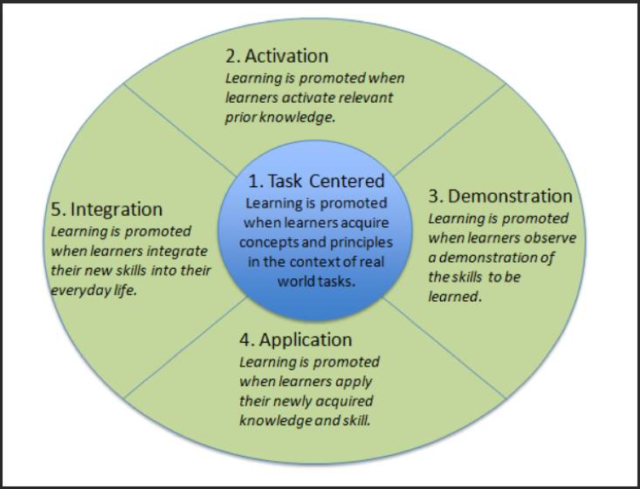by Max Cropper
Effective Training Design is Not All about the Media
Unfortunately, many training developers are so focused on media and technology as they develop online instruction, in many cases they forget about instructional strategies. They may believe that the media IS the strategy.
Contrary to this popular approach, Max Cropper, of Five Star Performance Solutions, focuses on using core, best-practice instructional strategies as the foundation of instruction, while leveraging media and technology to achieve efficient, effective, and engaging instruction.
Applying M. David Merrill’s First Principles of Instruction
The best-practice core training strategies that I recommend are M. David Merrill’s First Principles of Instruction, which use real-world tasks for demonstration, application, testing, and integration. Merrill’s First Principles synthesize most instructional design theories and accommodate most learning theories. This means you don’t have to look any further to find core training strategies that really work.
Merrill’s five principles which contribute to 5-Star instruction are:
- Task-Centered: Instruction uses real-world, meaningful whole tasks for demonstration, application, testing and integration, with a progression of real-world tasks throughout the course.
- Activation: Learners recall previous knowledge, are given a preview of the completed task, and a framework for mastering the task.
- Demonstration: Whole tasks are demonstrated effectively.
- Application: Learners are given the opportunity to practice whole tasks with diminishing guidance.
- Integration: Learners are given the opportunity to plan implementation, and implement the whole task(s) in a real-world setting.

Why Is It So Important to Use Merrill’s Task-Centered Approach for Instruction?
Because you must teach with real-world tasks if you want learners to be able to perform those real-world tasks in the workplace and in the real-world. And worker performance of significant real-world tasks leads to productivity and profitability!
If you don’t teach with real-world tasks, you can imagine what happens. Generally nothing happens. No significant performance improvement. Yet most instruction doesn’t teach with real-world tasks!
Real Life Example of 5-Star Instruction
I recently worked through Information Integration Inc. (i3) to help a global financial firm with some training and certification testing for Wealth Advisor Associates who were in training to become Financial Advisors. The real-world task was to meet with clients, provide an analysis of their financial situation, and recommend wealth-management and retirement strategies.
This real-world task became the center of the overall learning experience. The Activation gave associates a preview of financial advice meetings that they would be able to manage. The Demonstration included expert modeling of successful financial advice meetings. The Application included role plays in which the associates managed simulated financial advice meetings, and the Integration involved associates providing financial advice in meetings with actual clients.
Why are Merrill’s First Principles Some of the Best for Instruction and Learning?
Because it has been proven that teaching with real-world tasks in this way achieves the best performance results. A number of studies have demonstrated that the use of First Principles of Instruction has shown a significant improvement in learning (Thomson, 2002)(Merrill, 2002, 2006)(Cropper, 2007)(Cropper, Bentley, Schroder, 2009)(Frick, Chadha, Watson, & Wang, 2009) (Frick, Chadha, Watson, Wang & Green, 2010) (Frick, Chadha, Watson, & Zlatkovska, 2010)(Cropper, 2011)(Rosenberg-Kima, 2012) (Frick & Dagli, 2016)(Rangel & Berliner, 2007; Frick, et al., 2010b)(iu.edu, 2020).
While a majority of instruction may continue to be information-focused, developed with the assumption that media and technology will make it effective, savvy instructors and instructional developers will recognize that information is not instruction. They will transition to task-centered instruction, and will use real-world tasks for demonstration, application, and integration. By teaching with real-world tasks, learners will be able to perform those real-world tasks on the job and in the real world.
Max H. Cropper, CEO of Five Star Performance Solutions, is an award-winning instructional design consultant who has studied, researched, implemented, and taught best-practice instructional strategies for more than 40 years.





